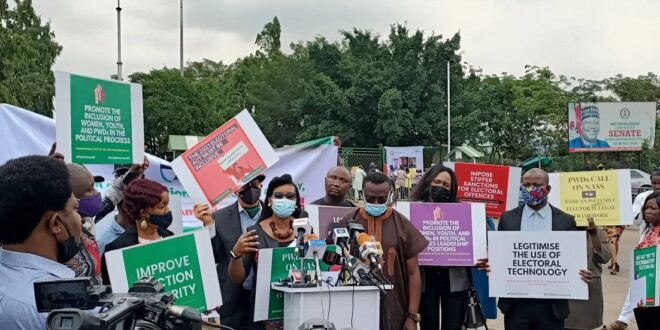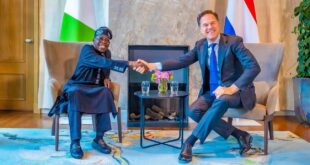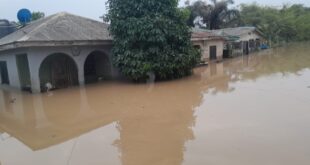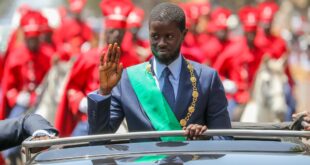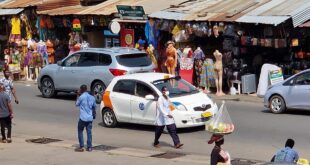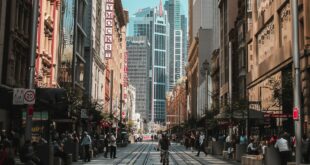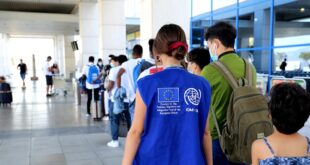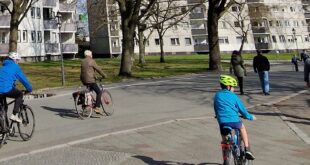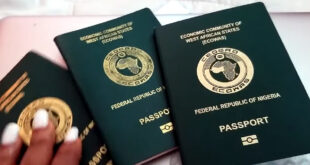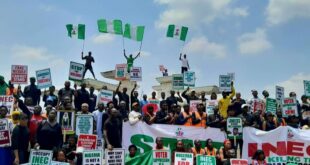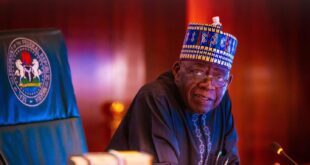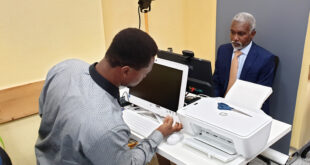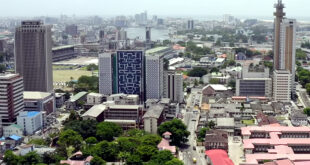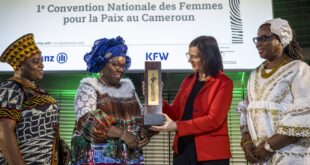About 17 million Nigerians are believed to live in the diaspora and they are constitutionally excluded from participation in their homeland’s electoral process from outside the country. Voters who are resident outside Nigeria can only vote during elections if they travel back to Nigeria to register as voters in Nigeria and to vote during elections in Nigeria.
As the country moves towards the 2023 general elections, Nigerians living abroad are renewing their agitation to be allowed to exercise their voting rights from their countries of residence.
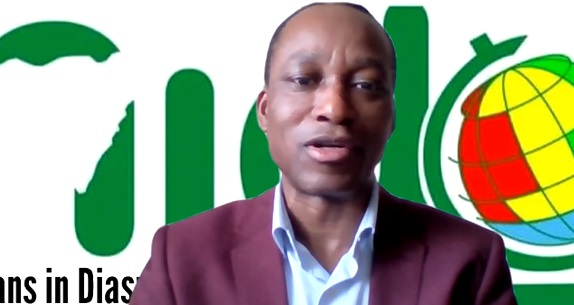
NIDOE chairman, Dr Bashir Obasekola, addressing the conference
Participants from across the globe therefore gathered via an online conference on 17 April to discuss how to actualise diaspora Nigerians’ dream of being able to vote at elections in their home country.
Organised by the Switzerland and Ireland chapters of the Nigerians in Diaspora Organisation Europe (NIDOE), the event was attended by the country’s ambassadors to Switzerland and Ireland, National Assembly members, the executive chairman of the Nigerians in Diaspora Commission (NIDCOM) and a representative of the Independent Electoral Commission (INEC), among other important stakeholders.
The virtual confab, jointly hosted by NIDOE chairman, Dr Bashir Obasekola, and his counterpart in the Americas, Engr Obed Monago, deliberated on the political and legal issues surrounding diaspora voting and the prospects of its introduction in Nigeria soonest.
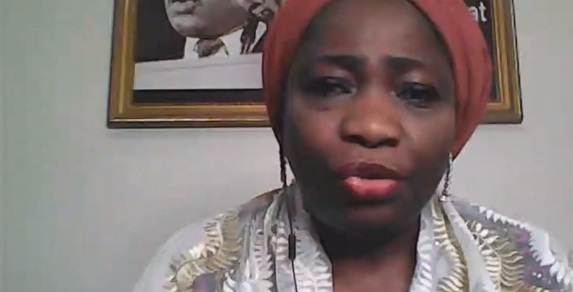
Hon Abike Dabiri-Erewa, the Chairman/CEO of NIDCOM, identified the major challenge facing diaspora voting as the constitutional requirement that a voter can only exercise their franchise in Nigeria
The debate, ably moderated by Engr Oluyemi Ogundele of NIDO Austria, kicked off with a presentation by Hon Abike Dabiri-Erewa, the Chairman/CEO of NIDCOM, who identified the major challenge facing diaspora voting as the constitutional requirement that a voter can only exercise their franchise in Nigeria.
She therefore called on the diaspora to actively engage the ongoing constitutional review process being carried out by the National Assembly to bring about the necessary amendment that will enable diaspora voting.
The NIDCOM chief pointed out the importance of NIDO and other diaspora organisations making presentations to support their campaign at the public hearings of the House and Senate committees on the review of the constitution, which are billed to take place in August.
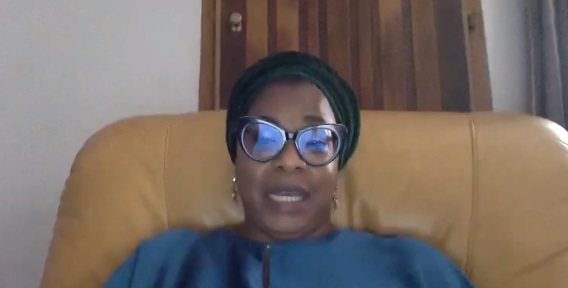
Chairman, House of Representatives’ Committee on Diaspora, Hon Tolulope Akande-Sadipe, advised the diaspora not to relent in the agitation for diaspora voting
Dabiri-Erewa warned NIDO members who are in partisan politics to desist from using the platform of the organisation to campaign for their parties. “Stop using NIDO as a political platform!” she charged. “It should not be like I want to contest and therefore we need diaspora voting.”
The NIDCOM head also appealed to Nigerians in the diaspora to register with their country’s diplomatic missions and speak with one voice on the ongoing campaign for diaspora voting rights, assuring that President Muhammadu Buhari supported the campaign.
In his submission, Senator (Dr) Ibrahim Oloriegbe, Vice Chairman, Senate Committee on Diaspora and NGOs, explained the process of constitutional amendment whereby proposals sent to the National Assembly have to be approved and then sent to the 36 states’ houses of assembly and approved by 2/3 of them before being returned to the National Assembly where it would be ratified and then sent to the President for assent.
Oloriegbe, who is a member of the Senate Ad-hoc Committee on Constitution Review, reveals that there were already two proposals on diaspora voting before the body.
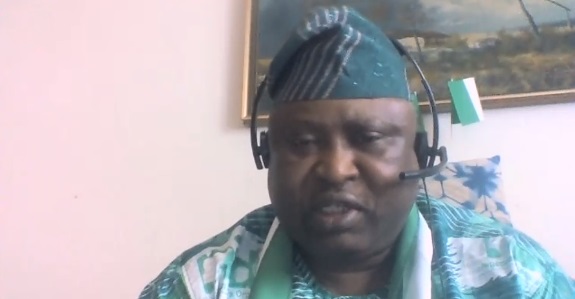
Engr. Oluyemi Ogundele, former chairman of NIDO Austria, ably moderated the event
The senator identified the constitutional amendment as the major challenge to diaspora voting. He also talked about other issues such as how to handle the cases of Nigerians with dual citizenship.
“Is it everybody who is outside the country – ether legally or illegally – that can vote?” he asked. “To which constituencies will the votes of diaspora voters be localised?” he continued. “Every voter must have a constituency.”
Oloriegbe also criticised some members of NIDO for being antagonistic to the ruling APC. “Since APC is in the majority in the National Assembly, attacking the party may not help the campaign for diaspora voting,” he warned.
He therefore advised campaigners for diaspora voting to be non-partisan and to premise their campaign on the collective interest of the diaspora.
The senator also advised diaspora organisations to actively engage the ongoing constitution review process by participating at the public hearings of the Senate committee in August and by lobbying parliamentarians and other stakeholders to support their cause.
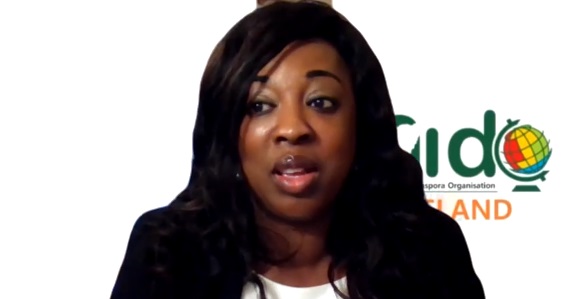
Vire Komolafe, acting chairman of NIDO Ireland, was co-convener of the virtual conference
Chairman, House of Representatives’ Committee on Diaspora, Hon Tolulope Akande-Sadipe, advised the diaspora not to relent in the agitation for diaspora voting. She said 48 countries in Africa already allowed some form of external voting and that only Nigeria and Liberia does not allow diaspora voting.
However, other sources say only some thirty African countries grant the right to vote to their nationals abroad, out of a total of 115 countries that apply the principle around the world.
“Seventeen million Nigerians abroad should not be denied their fundamental rights of voting,” she said.
Ms Akande-Sadipe, who returned from the US to contest for elections into the National Assembly, talked about her personal efforts to champion the cause of diaspora voting. A bill she’s sponsoring had gone through a second reading in the House, the federal parliamentarian said.
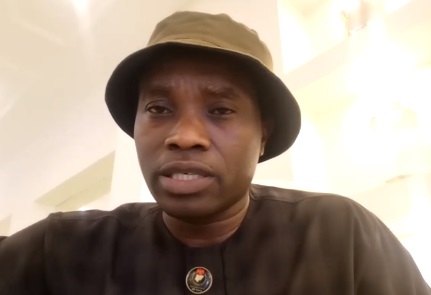
Dr Alistair Soyode, a former chairman of NIDOE and founder of BEN TV (UK), said giving voting rights to the diaspora would enable Nigerians abroad to make greater contributions to their country’s development
In view of the requirement that any constitutional amendment must be approved by 2/3 of the 36 states’ legislatures, Akande-Sadipe, who is also a member of the House Ad-hoc Committee on Constitution Review, called on the diaspora to lobby at the state level to secure support for the initiative.
To make NIDO stronger, she advised that the body should bring other diaspora organisations under its umbrella. This, she opines, would enable NIDO to act more effectively on behalf of the diaspora.
In his contribution, Dr Alistair Soyode, a former chairman of NIDOE and founder of BEN TV (UK), said giving voting rights to the diaspora would enable Nigerians abroad to make greater contributions to their country’s development.
Soyode, who is also founder of YESS party and a presidential aspirant at the last election, offered suggestions on how diaspora Nigerians could vote, for example, at their country’s missions.
NIDOE chairman, Dr Bashir Obasekola, in his intervention, spoke about the efforts of NIDO Worldwide to champion the cause of diaspora voting for many years. He recalled that the organisation presented a bill to the House of Representatives in 2006-7 but which unfortunately did not see the light of the day.
Obasekola praised past leaders of NIDO and other activists for their efforts on diaspora voting, assuring that the organisation was committed to inclusiveness and that it would take other stakeholders along.
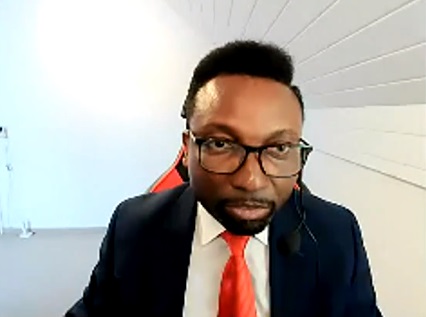
Dr Johnson Odibo, chairman of NIDO Switzerland, was co-convener of the virtual conference
The NIDOE chief expressed the organisation’s support for the inclusion of diaspora Nigerians in the National Identity Management System. He said NIDOE was therefore promoting the registration of Nigerians in Europe for the National Identification Numbers (NIN). Obasekola called for the integration of the embassies in the NIN registration process.
In his comments, the chairman of NIDO Americas, Engr. Obed Monago, said his organisation was committed to the cause of diaspora voting and would support INEC to generate a credible and authentic database for the participation of Nigerians abroad in national elections.
Munago called for unequivocal recognition of NIDO as the umbrella body of the organised Nigerian diaspora to enable it make greater contributions to national development.
The NIDOA chief advised the diaspora to make greater efforts to engage the political decision-making process in Nigeria through lobbying to enable it make a greater impact.
Barrister Festus Okoye, INEC National Commissioner and chairman of Voter Education and Publicity Committee, said the commission was committed to diaspora voting even as it was aware of the challenges in the way of its realisation.
Okoye cited challenges such as provisions of the constitution on the registration of voters, one of which is that voters must reside in Nigeria and a stipulation of the Electoral Act that demands that voters must present themselves personally at a polling unit in a constituency at which the voter was registered to vote.
The INEC commissioner also pointed out that diaspora Nigerians are not only those residing in the UK, US or Europe but also in countries such as Chad, Niger, Sudan and other countries across the globe. This means that the administrative challenge of conducting elections for the diaspora was mammoth. He however assured that INEC recognised the importance of the diaspora and was looking into the use of technology to address these challenges.
Okoye also briefed the conference on the efforts of INEC to digitalise its operations and the commission’s plan to introduce electronic voting.
The question-and-answer session enabled the audience to contribute to the debate.
Responding to a question on the role of NIDCOM in the advocacy for diaspora voting, Dabiri-Erewa talked about the efforts of the commission to engage the key stakeholders to win their support. She advised diaspora Nigerians to also lobby their representatives in the national and state assemblies so that the constitutional amendment enabling diaspora voting would be passed.
Festus Okoye of INEC also mentioned political challenges to the amendment of the constitution to allow diaspora voting, reminding his audience that given the size of the diaspora population their votes would alter national elections. This fact, he opined, might lead to opposition from some quatres that may deem diaspora voting not to be in their interest.
Obed Monago of NIDOA emphasised that NIDO was an open and inclusive organisation and individuals and other diaspora organisations could join it, as the body was meant to represent the collective diaspora community.
READ ALSO Why Nigerians in the Diaspora should be allowed to vote by Prince Ade Omole (UK)
In his closing remarks, Dr Bashir Obasekola of NIDOE, explained that NIDO was a non-political organisation and therefore its former leaders engaged in partisan politics were doing so as individuals and not as representatives of the organisation.
“They are individuals who are exercising their rights to participate in national politics,” he added. “Please see them as individuals and not as representatives of NIDO.”
The event, put together by Vire Komolafe, acting chairperson of NIDO Ireland, and Dr Johnson Odibo, chairman of NIDO Switzerland, was also attended by, among others, Nigerian Ambassador to Ireland, HE Uzoma Emenike, and her counterpart to Switzerland, Alhaji Baba Madugu, who also addressed the conference. Ambassador Emenike has since moved to Washington as Nigeria’s first female envoy to the US.
Femi Awoniyi
 THE AFRICAN COURIER. Reporting Africa and its Diaspora! The African Courier is an international magazine published in Germany to report on Africa and the Diaspora African experience. The first issue of the bimonthly magazine appeared on the newsstands on 15 February 1998. The African Courier is a communication forum for European-African political, economic and cultural exchanges, and a voice for Africa in Europe.
THE AFRICAN COURIER. Reporting Africa and its Diaspora! The African Courier is an international magazine published in Germany to report on Africa and the Diaspora African experience. The first issue of the bimonthly magazine appeared on the newsstands on 15 February 1998. The African Courier is a communication forum for European-African political, economic and cultural exchanges, and a voice for Africa in Europe.

